Alberta judge greenlights euthanasia for 27-year-old autistic woman DESPITE objections from her dad, who says she’s healthy – just ‘vulnerable’ due to mental health problems
A judge in Canada has cleared the way for the euthanasia of a 27-year-old autistic woman, despite objections from her father, who says she is “healthy” – only “vulnerable” because of her mental health problems.
In his ruling, Judge Colin Feasby acknowledged that the doctor-assisted death would cause the father “deep sorrow” but said the young woman’s right to end her own life trumped his feelings.
A publication ban protects the identity of the father, daughter and her doctors. The father is called WV and she is called MV.
“MV’s dignity and right to self-determination outweigh the important issues WV raises and the harm he will suffer from the loss of MV,” Feasby wrote in his 34-page ruling, released this week .
The euthanasia case between father and daughter is being heard at the Calgary Courts Center in Alberta
“While I believe WV has raised serious issues, I conclude that MV’s interests in autonomy and dignity outweigh competing considerations.”
The Calgary judge’s decision will be stayed for 30 days to give the father’s lawyers a chance to appeal.
The case highlights Canada’s euthanasia system, known as medical assistance in dying (MAiD), which has grown rapidly since its introduction in 2016, euthanizing more than 13,000 people every year.
MV lives with her father and was given permission for euthanasia in December.
According to Canadian news sources, she has not filed court documents explaining how she qualified for MAiD.
Her attorney, Austin Paladeau, said the case comes down to the daughter’s right to autonomy and that the father’s affection for his daughter “does not give him the right to keep her alive against her wishes.”
But WV says his daughter “is vulnerable and incapable of making the decision to commit suicide,” the judge wrote.
“He says she is generally healthy and believes her physical symptoms, if she has them, are the result of undiagnosed psychological conditions.”
Her only known diagnoses, previously detailed at an earlier hearing, were autism and hyperactivity disorder.
The father’s lawyers had requested a judicial inquiry into how the daughter received MAID approval.
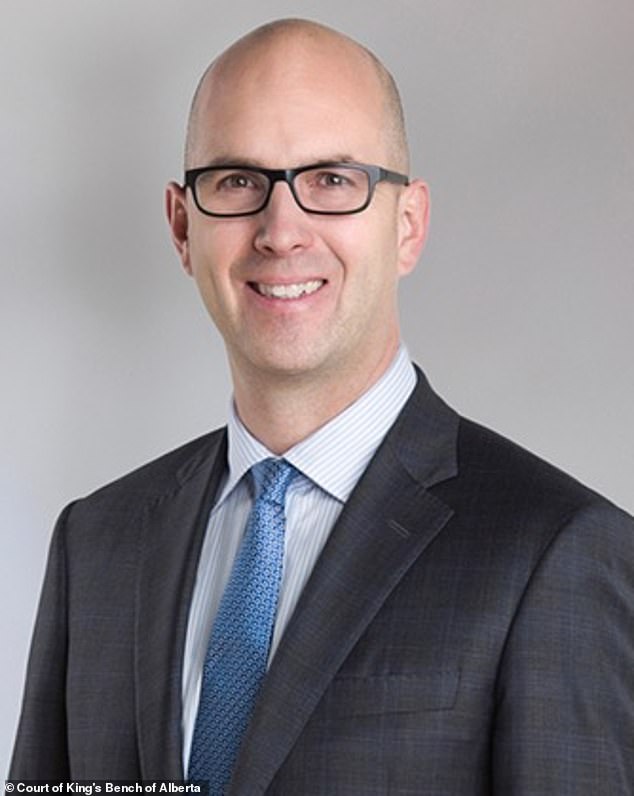
Judge Colin Feasby acknowledged the daughter’s death would be “devastating” for her parents

Alberta Health Services says euthanasia is a “sensitive and emotional” issue for people in the province
According to the Canadian euthanasia system, two doctors or nurses must give a patient the green light for MAiD.
When MV applied to Alberta Health Services for an assisted death, she was approved by one doctor and denied by another.
A third tie-breaker doctor then approved the procedure.
WV questioned the third doctor’s signature, saying he “was not independent or objective.”
In his ruling, Feasby said the young woman had “had difficulty finding a doctor who could diagnose (her) condition and provide appropriate treatment.”
“I don’t know why you are looking for MEID,” the judge wrote.
“Your reasons remain yours because I have respected your autonomy and your privacy.
“My decision recognizes your right to choose medically assisted death; but it does not require you to choose death.”
Without MAiD, the woman would have to choose between a life she considered unbearable and suicide, he said.
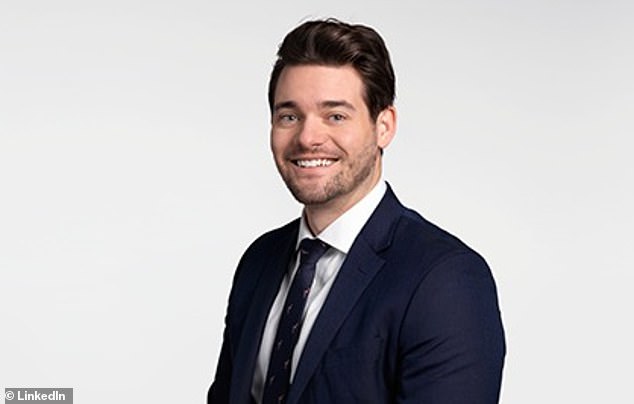
Attorney Austin Paladeau said the father cannot keep his daughter alive “against her wishes.”

Any adult in Canada with a serious illness, disease or disability can seek assistance in dying
“This is a terrible choice that should not be forced on MV because attempting to end her life without medical attention would put her at greater risk of pain, suffering and permanent harm,” he wrote.
Still, the daughter’s death would “devastate” the parents, the judge said.
“For many parents, the loss of a child is a life-changing event from which they never truly recover,” he wrote.
“The loss is immeasurable.”
The father’s lawyer, Sarah Miller, said it was not clear whether they would appeal the ruling and push for a judicial review of the case.
The father-daughter feud is the latest controversy to spotlight one of the world’s most permissive assisted dying programs.
Alex Schadenberg, leader of the Euthanasia Prevention Coalition campaign group, said it highlighted the problems with MAiD.
“Canada’s euthanasia law is not intended to protect vulnerable people,” Schadenberg said.
“The law is intended to protect doctors who are willing to kill.”
Many Canadians support euthanasia, and the campaign group Dying With Dignity says procedures are “driven by compassion, an end to suffering and discrimination and the desire for personal autonomy.”
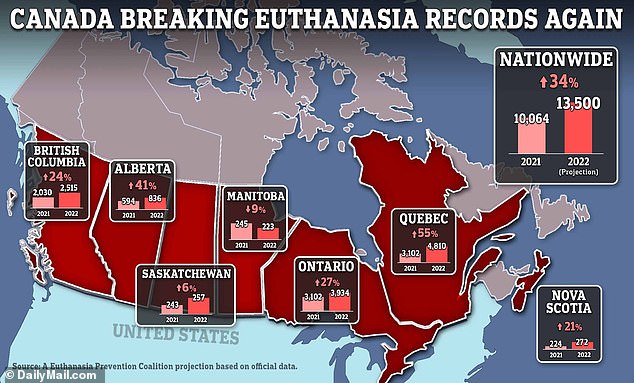
Canada has one of the highest assisted death rates in the world
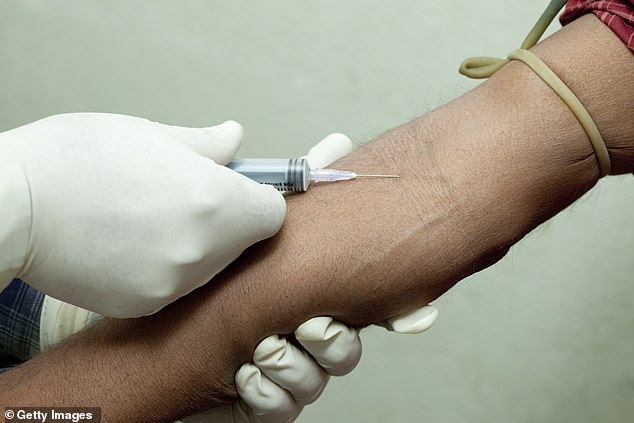
More than 99.9 percent of MAiD procedures in Canada are performed by a physician
Rights groups say the country’s regulations lack necessary safeguards, devalue the lives of disabled people and encourage doctors and health professionals to suggest the procedure to those who might not otherwise consider it.
The number of MAiD deaths increased by 31.2 percent to 13,241 between 2021 and 2022, official figures show.
About 44,958 people have received assisted death assistance since the federal MAiD law was introduced in 2016.
Canada’s path to allowing euthanasia began in 2015, when the Supreme Court declared that banning assisted suicide deprived people of their dignity and autonomy. It gave national leaders a year to draft legislation.
The resulting 2016 law legalized both euthanasia and assisted suicide for people aged 18 and over, provided they met certain conditions:
They had to have a serious, advanced condition, disease or disability that caused suffering and threatened their death.
The law was later amended to allow people who are not terminally ill to choose death, significantly expanding the number of eligible people.

Under Prime Minister Justin Trudeau’s Liberal government, Canada has repeatedly made access to euthanasia easier
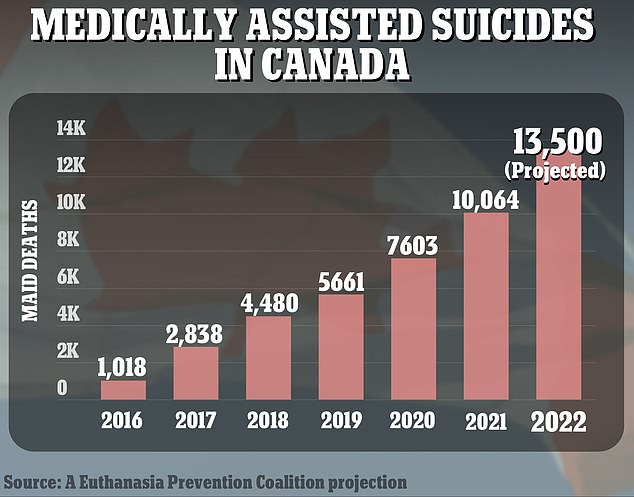
The number of MAiD deaths in Canada has been steadily increasing by about a third each year
Critics say change would remove an important safeguard aimed at protecting people who may have decades to live.
Today, any adult with a serious illness, disease or disability can seek help in dying.
Officials in February postponed plans to expand MAiD access to people with mental illnesses, pushing back a decision to 2027.
Efforts are also being made to make euthanasia available for ‘adult minors’.
Euthanasia is legal in seven countries – Belgium, Canada, Colombia, Luxembourg, the Netherlands, New Zealand and Spain – plus several states in Australia.
Other jurisdictions, including a growing number of U.S. states, allow physician-assisted suicide — in which patients take the drug themselves, typically crushing and drinking a lethal dose of pills prescribed by a doctor.
In Canada, both options are called MAiD, although more than 99.9 percent of such procedures are performed by a doctor. The number of MAiD deaths in Canada has been steadily increasing by about a third each year.
